Redefining the Industry to Remain Relevant—The Significance of AT&T’s Big Bet on Mobile
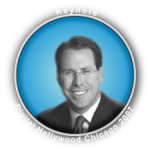 At Digital Hollywood Chicago, AT&T was busy redefining itself as a 21st century communications provider, and we believe that will increasingly mean focusing on content to provide profits. An AT&T veteran but new in 2007 as CEO, Randall Stephenson keynoted the conference by sharing his vision for AT&T and the future of the industry. At Digital Hollywood Chicago, AT&T was busy redefining itself as a 21st century communications provider, and we believe that will increasingly mean focusing on content to provide profits. An AT&T veteran but new in 2007 as CEO, Randall Stephenson keynoted the conference by sharing his vision for AT&T and the future of the industry.
Telecoms provide the network infrastructure of distributed computing and global communications, but infrastructure is a tough business with thin margins and high capital requirements. All telecoms are trying to move up the value chain to escape commoditization pressure and relentless price competition. For example, Sprint is betting heavily on WiMAX to redefine itself as the enabler of digital relationships.
In the context of telecoms redefinition, AT&T’s alliance with Apple could be very strategic for each company, as AT&T can use Apple’s design excellence to increase subscribers and push advanced network services while Apple needs a telecom partner to drive its relevance in the growing third screen market with the iPhone. According to Stephenson, the […]
Reading between the Lines: Apple’s New Business Strategy reveals why Apple could emerge as a three-screen player par excellence.
 Apple’s name change in early 2007 was heralded as the company’s redefinition as a consumer products company. The conventional wisdom held that the lion’s share of the run-up of Apple’s stock price had been due to the excitement of the iPod and the successful rekindling interest in the company’s Macintosh computers. Moreover, Apple’s stock had limited headroom because consumer electronics heavies were getting into the market for music players, and this would leech profits. The iPhone looked great, but it was overpriced in a hyper-competitive market; it wouldn’t penetrate much beyond a few gadget freaks. Apple’s name change in early 2007 was heralded as the company’s redefinition as a consumer products company. The conventional wisdom held that the lion’s share of the run-up of Apple’s stock price had been due to the excitement of the iPod and the successful rekindling interest in the company’s Macintosh computers. Moreover, Apple’s stock had limited headroom because consumer electronics heavies were getting into the market for music players, and this would leech profits. The iPhone looked great, but it was overpriced in a hyper-competitive market; it wouldn’t penetrate much beyond a few gadget freaks.
This prevailing view works great for Apple because it keeps people focused on the wrong things—literally. Apple’s business strategy is far more profound. It goes far beyond the SIC, hardware or even software. It is an experience strategy based on content and communications.
[…]
Rebooting Kraft—CEO Outlines Growth Strategy clearly shows the innovation imperative: A Play in Two Acts, Starring the Consumer.
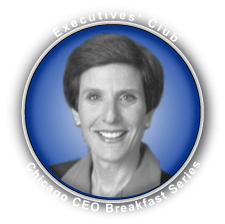 Irene B. Rosenfeld, Chairman & Chief Executive Officer of Kraft Foods, outlined her vision for relaunching Kraft at the Executives’ Club of Chicago’s Chicago CEO Breakfast on May 30, 2007 at the Mid-America Club. She was enthusiastic about the company’s second lease on life: having spun off of Altria this spring, the company is newly independent, and she was eager to share her plan to drive growth by addressing the “eye of the consumer.” Irene B. Rosenfeld, Chairman & Chief Executive Officer of Kraft Foods, outlined her vision for relaunching Kraft at the Executives’ Club of Chicago’s Chicago CEO Breakfast on May 30, 2007 at the Mid-America Club. She was enthusiastic about the company’s second lease on life: having spun off of Altria this spring, the company is newly independent, and she was eager to share her plan to drive growth by addressing the “eye of the consumer.”
Kraft Foods is the second largest food company in the world and the largest in North America. It has seven brands that produce revenue of over $1 billion and fifty that bring in over $100 million each. Central to her strategy is leveraging Kraft’s formidable brand portfolio and other economies of scale. Rosenfeld “came home to Kraft” about a year ago, having had highly visible leadership roles at the company in the past and the top job at Frito-Lay immediately prior.
[…]
Leadership, Trust and the Globally Integrated Enterprise reports on IBM’s CEO as he articulated a prescient vision for the enterprise—adapting to the Knowledge Economy.
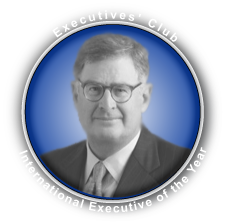 Samuel J. Palmisano, Chairman, President and Chief Executive Officer of IBM Corporation, outlined a new version of the enterprise at a lunch honoring him with the Executives’ Club of Chicago’s Thirteenth Annual International Executive of the Year Award April 12, 2007 at the Chicago Hilton. Entitled “Leadership, Trust and the Globally Integrated Enterprise,” his speech emphasized key points from his Summer 2006 article of the same name in Foreign Affairs. He was especially interesting to hear due to his experience with leading one of the world’s foremost global enterprises as well as his insight from serving global enterprises in every industry. Samuel J. Palmisano, Chairman, President and Chief Executive Officer of IBM Corporation, outlined a new version of the enterprise at a lunch honoring him with the Executives’ Club of Chicago’s Thirteenth Annual International Executive of the Year Award April 12, 2007 at the Chicago Hilton. Entitled “Leadership, Trust and the Globally Integrated Enterprise,” his speech emphasized key points from his Summer 2006 article of the same name in Foreign Affairs. He was especially interesting to hear due to his experience with leading one of the world’s foremost global enterprises as well as his insight from serving global enterprises in every industry.
Yesterday’s model for the global enterprise, the multinational corporation (MNC), looks increasingly outdated due to widespread adoption of standards-based technology, increasingly standardized work processes and a liberalizing regulatory environment. Today, knowledge-based resources are available globally, and the enterprise’s means to create value is choosing how and where to tap the resources to […]
Sprint Nextel’s Destiny and the Demand for a New Wireless Future reports on how Sprint Nextel is betting its future on a new wired society.
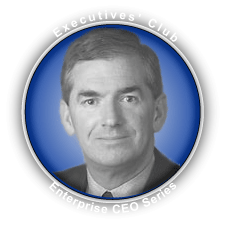 Gary D. Forsee, Chairman and CEO, Sprint Nextel Corporation, set the stage for the Executives’ Club of Chicago’s Technology Conference by outlining Sprint’s wireless strategy and a new vision for global community at the March enterprise CEO luncheon at the Chicago Hilton. Gary D. Forsee, Chairman and CEO, Sprint Nextel Corporation, set the stage for the Executives’ Club of Chicago’s Technology Conference by outlining Sprint’s wireless strategy and a new vision for global community at the March enterprise CEO luncheon at the Chicago Hilton.
Sprint’s long history reflects the transformation of the U.S. telecoms market. The company has had a key role in remaking the U.S. telecoms industry during its privatization. It competed as a competitive local exchange carrier (CLEC) and once earned most of its revenue from long distance services, which are now essentially free. After its 2005 merger with Nextel, virtually all its revenue comes from wireless services.
Moreover, Mr. Forsee promised that Chicago would be one of two pilot cities for Sprint’s WiMAX initiative later this year. Chicagoans will be among the first in the U.S. to try 4G network services.
Sprint’s Wireless Future
Sprint Nextel has seen the future, and it […]
UPS: Transforming Package Delivery into a One-to-One Business summarizes the CEO’s vision for meeting customer empowerment with transformation.
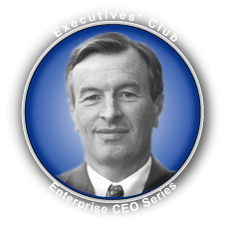 Michael L. Eskew, Chairman and CEO of UPS, outlined the package delivery giant’s vision for transforming itself into a “one-to-one” business at the Executives’ Club of Chicago’s Enterprise CEO Lunch, 15 February 2007. Before a packed house at the Chicago Hilton, he demonstrated UPS’s creative “whiteboard” marketing campaign and explained its role in communicating to customers the value of the company’s transformation. Michael L. Eskew, Chairman and CEO of UPS, outlined the package delivery giant’s vision for transforming itself into a “one-to-one” business at the Executives’ Club of Chicago’s Enterprise CEO Lunch, 15 February 2007. Before a packed house at the Chicago Hilton, he demonstrated UPS’s creative “whiteboard” marketing campaign and explained its role in communicating to customers the value of the company’s transformation.
The importance of UPS’s vision extends beyond UPS stakeholders because it reflects a shift in emphasis away from industrial efficiency to knowledge-based innovation. Make no mistake, efficiency is mission-critical to every business, but fewer companies can differentiate based on efficiency. To its considerable credit, UPS sees the shift and is striving to empower customers with information as well as delivery services.
A History of Transformation
Mr. Eskew set the context by emphasizing that UPS has a history of transforming itself to meet technology and market challenges:
Founder Jim Casey began the company as bicycle messenger service in 1907, but emerging technology, […]
The TransAtlantic Partnership’s Implications for U.S., E.U. Economies summarizes coverage of the EEC International Conference—Talking with the Ambassadors of the World’s Largest Trading Relationship and the CEOs of Four Global Enterprises.
 Three eminent diplomatic leaders and CEOs from Baxter, Financial Dynamics, ITW and Philips briefed Midwest executives on the current status and future directions of the world’s largest trading relationship at the Executives’ Club of Chicago’s International Conference November 15. The half-day program featured several presentations, a CEO panel and a media round table. All speakers sought to impress upon the audience the pivotal importance of the transatlantic alliance for the United States and Europe, and most warned chief executives neither to take it for granted nor to be passive in the face of rising protectionism. Three eminent diplomatic leaders and CEOs from Baxter, Financial Dynamics, ITW and Philips briefed Midwest executives on the current status and future directions of the world’s largest trading relationship at the Executives’ Club of Chicago’s International Conference November 15. The half-day program featured several presentations, a CEO panel and a media round table. All speakers sought to impress upon the audience the pivotal importance of the transatlantic alliance for the United States and Europe, and most warned chief executives neither to take it for granted nor to be passive in the face of rising protectionism.
The fact that the importance of the E.U.—U.S. alliance had to be emphasized brought into sharp relief the relatively sudden rise of Asia as well as the shift from the Industrial Economy to the Knowledge Economy. Both megatrends pose opportunities and threats for the world’s largest economies and enterprises, and […]
|
|
 At Digital Hollywood Chicago, AT&T was busy redefining itself as a 21st century communications provider, and we believe that will increasingly mean focusing on content to provide profits. An AT&T veteran but new in 2007 as CEO, Randall Stephenson keynoted the conference by sharing his vision for AT&T and the future of the industry.
At Digital Hollywood Chicago, AT&T was busy redefining itself as a 21st century communications provider, and we believe that will increasingly mean focusing on content to provide profits. An AT&T veteran but new in 2007 as CEO, Randall Stephenson keynoted the conference by sharing his vision for AT&T and the future of the industry.
 Apple’s name change in early 2007 was heralded as the company’s redefinition as a consumer products company. The conventional wisdom held that the lion’s share of the run-up of Apple’s stock price had been due to the excitement of the iPod and the successful rekindling interest in the company’s Macintosh computers. Moreover, Apple’s stock had limited headroom because consumer electronics heavies were getting into the market for music players, and this would leech profits. The iPhone looked great, but it was overpriced in a hyper-competitive market; it wouldn’t penetrate much beyond a few gadget freaks.
Apple’s name change in early 2007 was heralded as the company’s redefinition as a consumer products company. The conventional wisdom held that the lion’s share of the run-up of Apple’s stock price had been due to the excitement of the iPod and the successful rekindling interest in the company’s Macintosh computers. Moreover, Apple’s stock had limited headroom because consumer electronics heavies were getting into the market for music players, and this would leech profits. The iPhone looked great, but it was overpriced in a hyper-competitive market; it wouldn’t penetrate much beyond a few gadget freaks. Irene B. Rosenfeld, Chairman & Chief Executive Officer of Kraft Foods, outlined her vision for relaunching Kraft at the Executives’ Club of Chicago’s Chicago CEO Breakfast on May 30, 2007 at the Mid-America Club. She was enthusiastic about the company’s second lease on life: having spun off of Altria this spring, the company is newly independent, and she was eager to share her plan to drive growth by addressing the “eye of the consumer.”
Irene B. Rosenfeld, Chairman & Chief Executive Officer of Kraft Foods, outlined her vision for relaunching Kraft at the Executives’ Club of Chicago’s Chicago CEO Breakfast on May 30, 2007 at the Mid-America Club. She was enthusiastic about the company’s second lease on life: having spun off of Altria this spring, the company is newly independent, and she was eager to share her plan to drive growth by addressing the “eye of the consumer.” Samuel J. Palmisano, Chairman, President and Chief Executive Officer of IBM Corporation, outlined a new version of the enterprise at a lunch honoring him with the Executives’ Club of Chicago’s Thirteenth Annual International Executive of the Year Award April 12, 2007 at the Chicago Hilton. Entitled “Leadership, Trust and the Globally Integrated Enterprise,” his speech emphasized key points from his Summer 2006 article of the same name in Foreign Affairs. He was especially interesting to hear due to his experience with leading one of the world’s foremost global enterprises as well as his insight from serving global enterprises in every industry.
Samuel J. Palmisano, Chairman, President and Chief Executive Officer of IBM Corporation, outlined a new version of the enterprise at a lunch honoring him with the Executives’ Club of Chicago’s Thirteenth Annual International Executive of the Year Award April 12, 2007 at the Chicago Hilton. Entitled “Leadership, Trust and the Globally Integrated Enterprise,” his speech emphasized key points from his Summer 2006 article of the same name in Foreign Affairs. He was especially interesting to hear due to his experience with leading one of the world’s foremost global enterprises as well as his insight from serving global enterprises in every industry. Gary D. Forsee, Chairman and CEO, Sprint Nextel Corporation, set the stage for the Executives’ Club of Chicago’s Technology Conference by outlining Sprint’s wireless strategy and a new vision for global community at the March enterprise CEO luncheon at the Chicago Hilton.
Gary D. Forsee, Chairman and CEO, Sprint Nextel Corporation, set the stage for the Executives’ Club of Chicago’s Technology Conference by outlining Sprint’s wireless strategy and a new vision for global community at the March enterprise CEO luncheon at the Chicago Hilton. Michael L. Eskew, Chairman and CEO of UPS, outlined the package delivery giant’s vision for transforming itself into a “one-to-one” business at the Executives’ Club of Chicago’s Enterprise CEO Lunch, 15 February 2007. Before a packed house at the Chicago Hilton, he demonstrated UPS’s creative “whiteboard” marketing campaign and explained its role in communicating to customers the value of the company’s transformation.
Michael L. Eskew, Chairman and CEO of UPS, outlined the package delivery giant’s vision for transforming itself into a “one-to-one” business at the Executives’ Club of Chicago’s Enterprise CEO Lunch, 15 February 2007. Before a packed house at the Chicago Hilton, he demonstrated UPS’s creative “whiteboard” marketing campaign and explained its role in communicating to customers the value of the company’s transformation. Three eminent diplomatic leaders and CEOs from Baxter, Financial Dynamics, ITW and Philips briefed Midwest executives on the current status and future directions of the world’s largest trading relationship at the Executives’ Club of Chicago’s International Conference November 15. The half-day program featured several presentations, a CEO panel and a media round table. All speakers sought to impress upon the audience the pivotal importance of the transatlantic alliance for the United States and Europe, and most warned chief executives neither to take it for granted nor to be passive in the face of rising protectionism.
Three eminent diplomatic leaders and CEOs from Baxter, Financial Dynamics, ITW and Philips briefed Midwest executives on the current status and future directions of the world’s largest trading relationship at the Executives’ Club of Chicago’s International Conference November 15. The half-day program featured several presentations, a CEO panel and a media round table. All speakers sought to impress upon the audience the pivotal importance of the transatlantic alliance for the United States and Europe, and most warned chief executives neither to take it for granted nor to be passive in the face of rising protectionism.